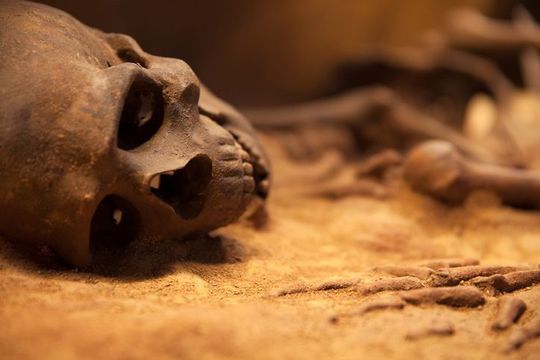
SkullGetty images
Archaeologists have found remains of human bones on this British farm
Archaeologists dug up Knobb's Farm in Somersham, Cambridgeshire from 2001 and 2010, and managed to find some pretty disturbing things.
The farm was believed to have been used to supply grain and meat to the Roman army in the 3rd Century, and the burial site that was discovered by archaeologists was likely to have been filled with the remains of slaves who were the victims of 'extreme justice' at the hands of the Roman army.
The team excavated three third-century cemeteries with bodies decapitated and buried in a prone position at the farm.
The team who discovered the remains was mainly comprised of archaeologists from Cambridge University. The bodies were found as they were killed - on their knees with their hands behind the back of their heads, with damage that indicated they had been struck by a sword.
In total three cemeteries were excavated at Knobb's Farm by the Cambridge archaeologists, revealing 52 individual burials and 17 decapitations.
Yes, you read that correctly. The Roman army was clearly bloodthirsty and sought to inflict extreme violence on it's victims.
The team involved with this dig said that the bodies date back to a particularly turbulent time for the Roman Empire. Punishments for any crimes against the Romans were becoming harsher and harsher, as seen in these remains.
Members of the team spoke about how unusual it is to find remains of humans that had been killed this way. They said "They are uncommon: across Britain, decapitations make up 2.3–3.7 per cent of Roman-era inhumation burials, while prone burials are slightly less common at 2–3 per cent. This limits opportunities to see patterns at the cemetery level or their relationship to other burials and each other. 'For this reason, the excavation of 17 decapitated bodies and 13 prone burials at Knobb's Farm provides a rare opportunity to examine patterns and practices."
Archaeologists have discovered 17 decapitated bodies at three Roman cemeteries in Cambridgeshire, eastern England -- an "exceptionally high' number which experts think were the result of judicial executions. https://t.co/XEfZc30I8y
— CNN International (@cnni) May 31, 2021





Comments